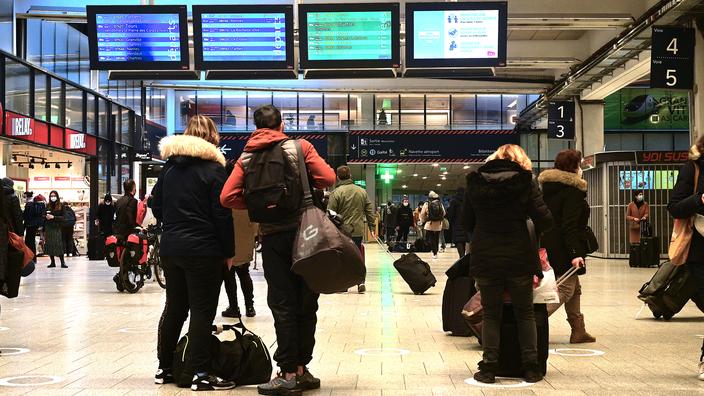Are late train passengers properly reimbursed?
This is the question addressed by the European Parliament, which adopted a new regulation on Thursday
"to better protect rail travelers in the event of delay or cancellation or in the event of discrimination"
.
Read also: Canceled flights: when the quest for reimbursement turns into a nightmare
This agreement, approved with the Member States, in fact modifies the regulations on reimbursement of train tickets. From now on, in the event of a delay of more than 60 minutes, passengers will be able to
“choose to be fully reimbursed for the price of the ticket”
. They will also have the option of
"continuing their journey or being rerouted under comparable transport conditions, but at no additional cost". "If the rail operator does not communicate the rerouting options within 100 minutes of the scheduled departure, passengers will be able to plan an alternative route themselves and get the new ticket reimbursed
,
"
MEPs said in a statement. .
Currently, people traveling on board an Inoui TGV or SNCF Intercité are offered a refund of 25% of the ticket price if the train is between 30 minutes and 2 hours late. The reimbursement goes up to 50% in the event of a delay of two to three hours. And even when the latter exceeds three hours, passengers will only be able to recover 75% of the ticket price. In the case of the Transilien, SNCF does not offer
"any compensation offer, except in exceptional circumstances such as the Seine flood in 2016"
.
Asked by
Le Figaro
, the railway company ensures that the proposed reimbursements go beyond what currently requires European law, without however commenting on the new regulation adopted on Thursday.
Indeed, the EU regulation dated October 23, 2007 allows a refund of 25% of the ticket price from 60 minutes late against 30 minutes for the SNCF.
The health crisis has become a case of "force majeure"
However, these new reimbursement terms will not apply in the event of
"force majeure"
.
The new regulation also introduces
“serious public health crises and terrorist attacks”
in this category, alongside extreme weather conditions and major natural disasters.
Strikes by railway personnel are not considered to be such.
More space for bicycles
In addition to the reimbursement of tickets, the European Parliament has also looked into the access of travelers with a bicycle on board trains. The latter must
“all”
“be equipped with
“ spaces and racks reserved for bicycles, with at least four spaces for bicycles in each train ”
. For its part, the SNCF already ensures compliance with French law in this area. The mobility orientation law, promulgated in 2019, indeed provides for
"a minimum threshold of 8 bicycle spaces to be provided on board trains"
but which only applies
"on board new and renovated trains assigned to the transport of travelers ”
. A threshold that can be lowered to 4 in the TER.
New provisions are also planned by Europe for travelers with reduced mobility who
“will have greater flexibility in the organization of their trip”.
Indeed, they will be able to communicate the details of their journey to the operator only 24 hours in advance against 48 hours currently.
If an accompanying person is required, he will be able to travel for free, the statement added, adding that people accompanied by an assistance dog
"will have the guarantee that the animal can travel with them"
.
A regulation to be applied in two years at the latest
All EU countries are affected. Indeed, these new rules will apply
"in principle to all national and international rail journeys and services throughout the EU
"
,
specify MEPs. But train users will have to be patient. Because, if the regulation enters into force 20 days after its publication in the official journal of the EU, its member states will have up to two years, at the latest, to start applying it and four years for the rules concerning the pitches. by bikes. They will also be able to exempt their rail services for a limited period.

